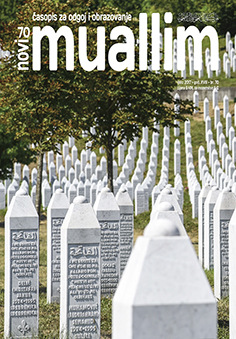ESTIMATING THE FEAR OF EVALUATIONS IN SCHOOLS
DOI:
https://doi.org/10.26340/muallim.v18i70.1584Keywords:
evaluation, students, teachers, school, FearAbstract
UDK 159.9
371.26
The fear of the achievement evaluation is ever present and relevant issue at schools. To what extent and in what manner the fear of evaluation is manifested in students of elementary and secondary schools, as estimated by the teachers, represents the subject matter of this article. Survey method was used and the respondents were teachers from a elementary school in Travnik and a high school in Jajce. It's a transversal study. Respondents voluntarily participated in the research. In addition to basic data on the respondents, the research tool contains a scaling factor of 21 items on the fear of evaluation, which is divided into three subscales of psychosomatic reactions, fear of failure and social devaluation. The results of the research show that the fear of evaluation is present in students significantly, but also it shows that all three forms of manifestation of fear of assessment: psychosomatic reactions, fear of failure and social devaluation are more present or more intensive in secondary school pupils than is the case students attending elementary school, with 99% reliability. The conclusion is that a way should be found to alleviate the fear of being evaluated primarily in secondary school students where the extent of fear of assessment is more alarming. Our proposal for any future research on this topic is to have a larger number of respondents, to compare students in general class- teaching and subject-teaching, to include in the gender question in the analysis and the overall academic achievement of students in order to find an adequate solution to this problem.
Downloads
Published
How to Cite
Issue
Section
License
Naknada:
a. Časopis ne naplaćuje naknadu za obradu članaka (APC) i naknadu za podnošenje članaka.
Autori koji objavljuju u ovom časopisu pristaju na sljedeće uvijete:
- Autori zadržavaju autorska prava i pružaju časopisu pravo prvog objavljivanja, pri čemu će rad jednu godinu po objavljivanju biti podložan licenci Creative Commons imenovanje koja omogućuje drugima da dijele rad uz uvijet navođenja autorstva i izvornog objavljivanja u ovom časopisu.
- Autori mogu izraditi zasebne, ugovorne aranžmane za ne-ekskluzivnu distribuciju rada objavljenog u časopisu (npr. postavljanje u institucionalni repozitorij ili objavljivanje u knjizi), uz navođenje da je rad izvorno objavljen u ovom časopisu.


